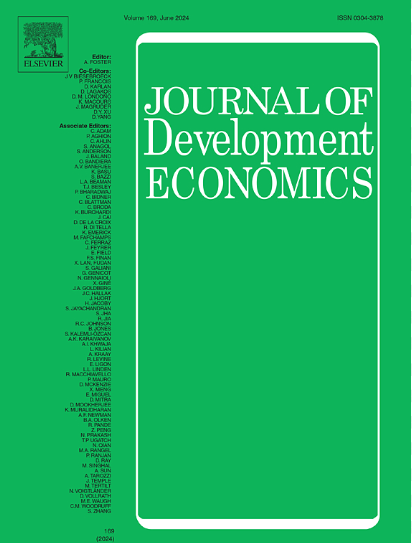解决协调失灵:集体土地出让权与农村创业
IF 4.6
1区 经济学
Q1 ECONOMICS
引用次数: 0
摘要
本研究探讨加强公共土地权利是否能解决土地权属碎片化导致的协调失灵问题。基于中国雄心勃勃的土地改革允许农村集体直接向企业出售或出租其建设用地,我们发现,集体土地出让权促进了农村创业25%。这种积极的稳定增长完全集中在集体协调较容易实现的地区(即崎岖较少的地区和氏族网络较密集的地区)。我们确定了创业增长背后的两条具体途径:降低企业的土地使用成本和增加当地居民的土地财富。改革还促进了非农业工资就业的扩大,主要是由于更积极地参与劳动力市场,而不是通过农业部门的下降。我们的研究结果强调了社区权利和集体谈判在降低协调成本方面的重要性,并为促进发展中国家的农村发展提供了新的见解。本文章由计算机程序翻译,如有差异,请以英文原文为准。
Solving coordination failures: Collective land transfer rights and rural entrepreneurship
This study explores whether strengthening communal land rights can address coordination failures caused by fragmented land tenure. Based on China's ambitious land reform that permits rural collectives to directly sell or rent their construction land to enterprises, we discover that collective land transfer rights boost rural entrepreneurship by 25%. This positive firm growth is entirely concentrated in regions where collective coordination is simpler to achieve (i.e., less rugged areas and regions with denser clan networks). We identify two specific pathways behind the entrepreneurial growth: lower land use costs for firms and increased land wealth for local residents. The reform also facilitates expansion into non-farm wage employment, mainly due to more active participation in the labor market rather than via a decline in the agricultural sector. Our findings emphasize the importance of communal rights and collective negotiation in reducing coordination costs and offer new insights into promoting rural development in developing countries.
求助全文
通过发布文献求助,成功后即可免费获取论文全文。
去求助
来源期刊

Journal of Development Economics
ECONOMICS-
CiteScore
8.30
自引率
4.00%
发文量
126
审稿时长
72 days
期刊介绍:
The Journal of Development Economics publishes papers relating to all aspects of economic development - from immediate policy concerns to structural problems of underdevelopment. The emphasis is on quantitative or analytical work, which is relevant as well as intellectually stimulating.
 求助内容:
求助内容: 应助结果提醒方式:
应助结果提醒方式:


